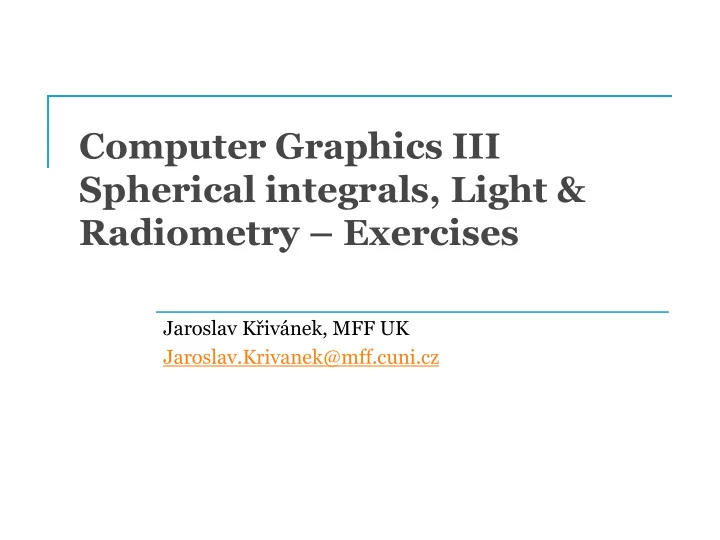

Computer Graphics III Spherical integrals, Light & Radiometry – Exercises Jaroslav Křivánek, MFF UK Jaroslav.Krivanek@mff.cuni.cz
Reminders & org ◼ Renderings due next week ❑ Upload to google drive, show on the big screen, 5 minutes per team (how many teams do we have) ◼ Papers for presentations in the lab – 7.11., 21.11, ❑ ACM TOG special issue on production rendering https://dl.acm.org/citation.cfm?id=3243123&picked=prox ◼ Reminder – choose papers for the exam ❑ http://kesen.realtimerendering.com/ ◼ Log your choices here ❑ https://docs.google.com/document/d/128e4Dgh0IvH64DI6Ohu 2eRGth0m5i8WlKpDwNyJzpVM/edit?usp=sharing ◼ Decide assignments track vs. individual project track by Wed, Oct 31 st 2018. CG III (NPGR010) - J. Křivánek
PEN & PAPER EXERCISES CG III (NPGR010) - J. Křivánek
Surface area of a (subset of a) sphere ◼ Calculate the surface area of a unit sphere. ◼ Calculate the surface area of a spherical cap delimited by the angle q 0 measured from the north pole. ◼ Calculate the surface area of a spherical wedge with angle f 0 . CG III (NPGR010) - J. Křivánek
Solid angle ◼ What is the solid angle under which we observe an (infinite) plane from a point outside of the plane? ◼ Calculate the solid angle under which we observe a sphere with radius R , the center of which is at the distance D from the observer. CG III (NPGR010) - J. Křivánek
Isotropic point light ◼ Q: What is the emitted power (flux) of an isotropic point light source with intensity that is a constant I in all directions? CG III (NPGR010) - J. Křivánek
Isotropic point light ◼ A: Total flux: substitute : = = I ( ) d = q q d sin d d 2 = q q I sin d d = q = 0 0 = − q I 2 cos 0 = 4 I = I 4 CG III (NPGR010) - J. Křivánek
Cosine spot light ◼ What is the power (flux) of a point source with radiant intensity given by: = s I ( ) I max{ 0 , d } 0 CG III (NPGR010) - J. Křivánek
Spotlight with linear angular fall-off ◼ What is the power (flux) of a point light source with radiant intensity given by: CG III (NPGR010) - J. Křivánek
V ýpočet CG III (NPGR010) - J. Křivánek
Irradiance due to a Lambertian light source ◼ What is the irradiance E ( x ) at point x due to a uniform Lambertian area source observed from point x under the solid angle ? CG III (NPGR010) - J. Křivánek
CG III (NPGR010) - J. Křivánek
Based in these hints, calculate the solid angle under which we observe the Sun. (We assume the Sun is at the zenith.) CG III (NPGR010) - J. Křivánek
Irradiance due to a point source ◼ What is the irradiance at point x on a plane due to a point source with intensity I ( ) placed at the height h above the plane. p ◼ The segment connecting point x d to the light position p makes the angle q with the normal of the plane. q x d A CG III (NPGR010) - J. Křivánek
Irradiance due to a point source ◼ Irradiance of a point on a plane lit by a point source: d ( ) x = E ( ) x dA p → I ( ) d p x = d dA q cos = → I ( ) p x q − 2 p x q 3 cos = → x I ( ) d A p x 2 h CG III (NPGR010) - J. Křivánek
Area light sources ◼ Emission of an area light source is fully described by the emitted radiance L e ( x , ) for all positions on the source x and all directions . ◼ The total emitted power (flux) is given by an integral of L e ( x , ) over the surface of the light source and all directions. = q L ( , ) cos d d A x e A H ( ) x CG III (NPGR010) - J. Křivánek
Diffuse (Lambertian) light source ◼ What is the relationship between the emitted radiant exitance (radiosity) B e ( x ) and emitted radiance L e ( x , ) for a Lambertian area light source? Lambertian source = emitted radiance does not depend on the direction L e ( x , ) = L e ( x ). CG III (NPGR010) - J. Křivánek
Diffuse (Lambertian) light source ◼ L e ( x , ) is constant in ◼ Radiosity: B e ( x ) = L e ( x ) = q B ( ) L ( , ) cos d x x e e H ( ) x = q L ( ) cos d x e H ( ) x = L ( ) x e CG III (NPGR010) - J. Křivánek
Uniform Lambertian light source ◼ What is the total emitted power (flux) of a uniform Lambertian area light source which emits radiance L e ❑ Uniform source – radiance does not depend on the position, L e ( x , ) = L e = const. CG III (NPGR010) - J. Křivánek
Uniform Lambertian light source ◼ L e ( x , ) is constant in x and e = A B e = A L e CG III (NPGR010) - J. Křivánek
Recommend
More recommend